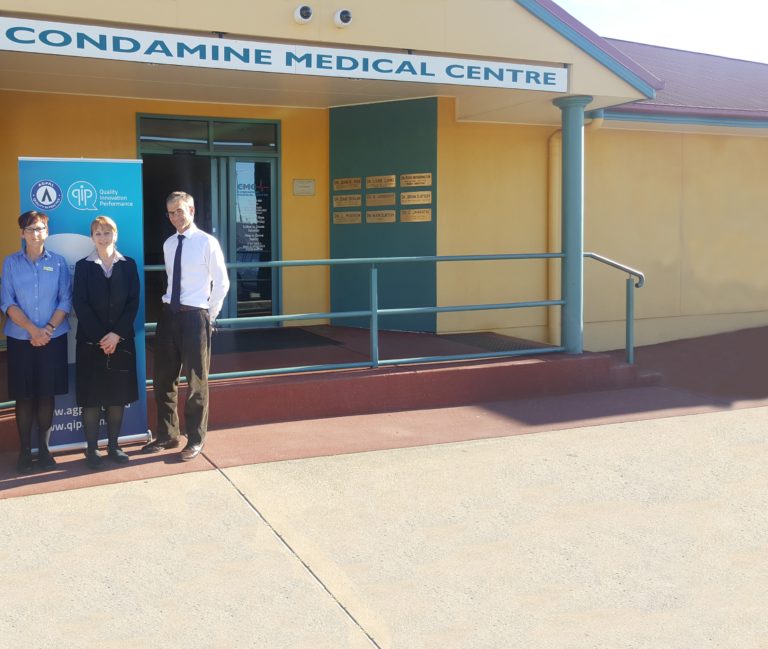Practices in Focus
Condamine Medical Centre

Condamine Medical Centre have embraced the power of technology and completed their sixth accreditation cycle with AGPAL.
Warwick, known as the ‘Rose and Rodeo Capital’ of Australia, is home to 15,000 people, and is serviced by two medical centres, one of which is Condamine Medical Centre. Located two hours inland from Brisbane, Queensland, Condamine Medical Centre operates from a purpose built premises with an on-site pharmacy and pathology, with a physiotherapist and X-Ray facilities a short walk away.
Condamine Medical Centre has embraced the power of technology in many ways. Utilising an online booking system provides improved accessibility of care, as patients can now book appointments from anywhere at any time of the day or night.
Additionally, Condamine Medical Centre has posted a series of educational health podcasts on their website about a range of topics from mental health and alcohol, to acne and the flu. These podcasts offer medical insights from Condamine’s general practitioners for not only their patients, but people worldwide to listen to and learn from. Condamine Medical Centre recently completed their sixth cycle of accreditation.
Interview
AGPAL and QIP staff member Bennet Aladin, Manager Health and Human Services – National Development Team, spoke with Practice Manager, Mrs Debbie Andersen, to learn about their experience.
Bennet: Can you share with us your tips for preparing for each accreditation cycle?
Debbie: Having undergone accreditation five times, we are certainly not new-comers to it but this by no means implies we could rest on our laurels. We are very conscious of maintaining our standards from cycle to cycle, and we have not found this burdensome. Having said that, we constantly monitor our systems regardless, if something is not working we implement a change. As for “preparing for each accreditation cycle” I would like to think we are pretty much in a constant state of “preparedness”, however starting early is an almost failsafe way to have the team ready for the actual visit.
Bennet: What quality improvements or innovative ideas has your practice implemented as a result of accreditation?
Debbie: Undergoing accreditation gave us the idea of weekly clinical meetings and the concept of clinical governance. This has been useful in the training of registrars, as well as improving the variance of treatment across the practice.
Bennet: Can you tell us more about the practices, history and services provided to the local community?
Debbie: Condamine Medical Centre formed following an amalgamation of three local practices into a purpose built building in the year 2000. It is noteworthy to mention that each of the three practices were accredited independently prior to amalgamation, so it was “business as usual” to gain accreditation for Condamine Medical Centre. At that time we had ten doctors.
The practice has now grown and adapted with major expansions undertaken to now accommodate more than twenty doctors, a ten bay nursing area, three minor operating rooms, chronic disease clinic and more. We look after residents in our two local nursing homes, and also care for private inpatients. Condamine Medical Centre offers extended appointment hours seven days a week and we also provide our own after-hours service.
Bennet: How have you seen accreditation change over the 15+ years?
Debbie: The obvious change has been raising the bar of the standards, and we are certainly aware of the necessity of this. It is indicative of the changing climate of General Practice, and in gearing its’ leaders to implement positive change, which in turn, has a flow-on effect for our patients.
Bennet: Do you have any hints or tips to pass on to other general practices to assist them throughout the accreditation process?
Debbie: Start early, involve the team, have regular meetings and reviews. Throw a positive spin on the experience of accreditation. It is not as daunting as it appears. When possible, delegate a team leader for particular areas. For example, our RN in-charge has been with us since inception. She has been instrumental in setting and maintaining high standards in our clinical areas. Encouraging the practice team to embrace change is important, as is demonstrating why we should be always looking for ways to, not only improve what we do, but how we do it.
Bennet: Condamine Medical Centre’s tag line is “to be an Australian Leader in patient centred care”. What does this mean to you? How do you work towards achieving this?
Debbie: Our patients are the primary focus in all that we do. This in itself lends us to be continually on the lookout for ways to improve our delivery of care. The changing needs and expectations of our patients actually help us to ensure we don’t become complacent. We place great value on patient feedback and consultation- it keeps us grounded; it is vital that we listen and act on their concerns and ideas. It reminds us that we never “really arrive”, there is always room for improvement.
Bennet: Has your practice used patient feedback or community consultation to promote quality, innovation or health care?
Debbie: Patient feedback indicated waiting times were an issue. We have had meetings with the doctors and staff, reviewed our booking systems, measured waiting times on the software, and looked to streamline some consultation types. We hope this will improve this problem, and it will continue to be measured and managed.




